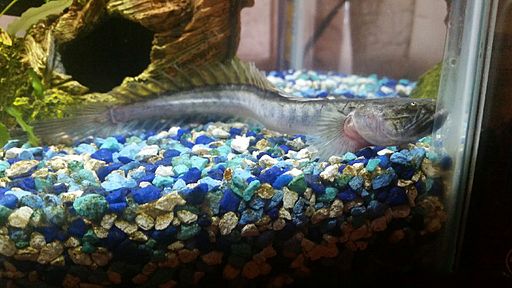If you’re looking to add a touch of exoticism to your freshwater aquarium, keeping dragon fish might be just what you need. These majestic creatures are a colorful sight to behold and can make for great pets. However, before you dive in, there are a few things you need to know to ensure your dragon fish thrive in their new home. In this article, we’ll cover everything from proper tank set up to diet and care to help you keep your dragon fish healthy and happy. So, let’s get started!
Dragon fish, also known as Arowanas, are beautiful and fascinating creatures to keep in your freshwater aquarium. However, they require a lot of care and attention to thrive. To keep them healthy, you will need a large tank, a good filtration system, and a diet of live or frozen foods. You will also need to monitor the water quality regularly and make adjustments as needed. With the right setup and care, dragon fish can be a stunning addition to your aquarium.

Keeping Dragon Fish in Your Freshwater Aquarium: What You Need to Know
Dragon fish, also known as Arowanas, are a popular species of freshwater fish in the aquarium hobby. These magnificent creatures can grow up to 3 feet in length and require a large tank with specific water conditions to thrive. In this article, we’ll explore everything you need to know about keeping dragon fish in your freshwater aquarium.
Choosing the Right Tank Size
Dragon fish are large and active swimmers, so they need a spacious tank to thrive. A single adult dragon fish should have at least a 125-gallon tank, with a minimum length of 6 feet. This will give them plenty of room to swim and explore. If you plan on keeping multiple dragon fish, you’ll need an even larger tank.
When selecting a tank, choose one with a sturdy stand that can support the weight of the tank and the water. Dragon fish can be heavy, and you don’t want to risk a tank falling and breaking.
Setting Up the Tank
Once you have your tank, it’s time to set it up. Dragon fish prefer warm, slightly acidic water with a pH between 6.5 and 7.5. It’s important to use a high-quality water conditioner to remove chlorine and other harmful chemicals from the water.
Dragon fish also need plenty of hiding places, such as caves, tunnels, and plants. Use a substrate that won’t scratch their scales, such as sand or smooth gravel. You can add live or artificial plants to create a natural environment and provide hiding spaces.
Feeding Your Dragon Fish
Dragon fish are carnivores and require a high-protein diet. They’ll eat just about anything that fits in their mouth, including fish, shrimp, insects, and even small rodents. You can feed them frozen or live foods, such as bloodworms, brine shrimp, and crickets.
It’s important to vary their diet and avoid feeding them only one type of food. A varied diet will ensure they receive all the necessary nutrients and keep them healthy.
Maintaining Water Quality
Maintaining water quality is crucial to keeping your dragon fish healthy. You’ll need to perform regular water changes to remove waste and debris and maintain the proper water parameters. Test the water frequently to ensure the pH, ammonia, nitrite, and nitrate levels are within an acceptable range.
Investing in a quality filtration system is also important. Dragon fish produce a lot of waste, and a good filter will help keep the water clean and clear.
Compatibility with Other Fish
Dragon fish are aggressive and territorial, so they’re not suitable for community tanks. They’ll attack and eat smaller fish, and even other dragon fish if they feel threatened. It’s best to keep them alone or with other large, aggressive fish that can hold their own.
Common Health Issues
Like all fish, dragon fish can develop health issues if their environment isn’t suitable. They’re susceptible to bacterial infections, parasites, and fungal diseases. Keep an eye out for signs of illness, such as lethargy, loss of appetite, and abnormal behavior.
If you notice any signs of illness, remove the affected fish immediately and treat the tank with a suitable medication. Preventative measures, such as regular water changes and a varied diet, can help keep your dragon fish healthy.
Benefits of Keeping Dragon Fish
Despite their high maintenance requirements, dragon fish are a popular choice for aquarium enthusiasts. They’re beautiful and majestic fish that can live up to 20 years with proper care. They also have a unique personality and can recognize their owners.
Dragon fish are also considered a symbol of good luck and prosperity in some cultures. They’re often kept in businesses and homes as a good luck charm.
Dragon Fish vs. Other Large Fish
If you’re considering keeping a large fish in your aquarium, you may be wondering how dragon fish compare to other species. While there are many large fish to choose from, dragon fish are a popular choice because of their unique appearance and personality.
They require a large tank and specific water conditions, but if you’re willing to put in the effort, they can be a rewarding addition to your aquarium.
Conclusion
Keeping dragon fish in your freshwater aquarium requires a lot of work and dedication, but the rewards are worth it. These majestic fish are a unique addition to any aquarium and can provide years of enjoyment. By following the tips in this article, you can create a suitable environment for your dragon fish and help them thrive.
Frequently Asked Questions
Dragon fish are unique and fascinating creatures that can add a touch of exotic beauty to your freshwater aquarium. However, keeping them requires a certain level of expertise and knowledge. Here are some common questions about keeping dragon fish in your freshwater aquarium:
1. What do dragon fish eat?
Dragon fish are carnivorous and require a diet of live or frozen foods such as bloodworms, brine shrimp, and small fish. They have a voracious appetite and should be fed small amounts several times a day. It is important to avoid overfeeding as this can lead to health problems.
Dragon fish are also known for their ability to jump out of the water when feeding, so it is important to cover your tank to prevent any mishaps.
2. How big do dragon fish get?
Dragon fish can grow up to 24 inches in length, so it is important to provide them with a large enough tank. A minimum tank size of 75 gallons is recommended for one dragon fish, and an additional 50 gallons for each additional fish.
It is important to note that dragon fish can be aggressive towards other fish, so it is best to keep them in a species-only tank or with other large, aggressive fish.
3. What is the ideal water temperature and pH level for dragon fish?
Dragon fish are native to Southeast Asia and prefer warm, acidic water with a pH level between 5.5 and 7.5. The ideal water temperature for dragon fish is between 75 and 82 degrees Fahrenheit.
It is important to maintain consistent water conditions and perform regular water changes to ensure the health and well-being of your dragon fish.
4. How do I create a suitable habitat for my dragon fish?
Dragon fish are nocturnal and prefer a dimly lit tank with plenty of hiding places such as caves and plants. It is important to provide a sandy substrate as dragon fish like to bury themselves during the day.
A strong filtration system is also important as dragon fish produce a lot of waste. You may also want to add driftwood and rocks to the tank to create a natural environment and provide hiding places for your dragon fish.
5. What are some common health problems that dragon fish may encounter?
Dragon fish are susceptible to parasitic infections, bacterial infections, and fungal infections. Symptoms of illness may include lethargy, loss of appetite, and abnormal swimming behavior.
It is important to monitor your dragon fish closely and seek veterinary care if you notice any signs of illness. Regular water changes and maintenance can also help prevent health problems in your dragon fish.

Senegal Bichir Care Guide – Feeding & Size
In conclusion, keeping dragon fish in your freshwater aquarium can be a rewarding experience, but it requires a lot of preparation and maintenance. These fish are not for beginners, and it’s important to do your research before adding them to your tank.
First and foremost, make sure your tank is big enough for the dragon fish to thrive. They need plenty of space to swim and hide. Additionally, they require a specific water temperature and pH level, so be prepared to invest in a good quality water testing kit and heater.
Furthermore, dragon fish are carnivorous and will eat smaller fish, so it’s essential to choose tank mates carefully. Finally, always keep an eye on your dragon fish’s behavior and health. Any signs of stress or illness should be addressed immediately.
Overall, if you are willing to put in the time and effort, keeping dragon fish in your freshwater aquarium can be a beautiful and fascinating addition to your home. Just remember to do your research and provide the best care possible for these unique and captivating creatures.
